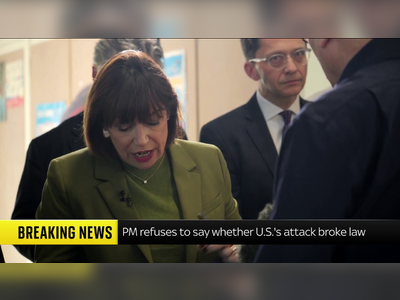Brazil Latest Country To Ban X
Today's CNNBC top topic highlights a deeply troubling development in Brazil. A Supreme Court judge, accused of corruption, has blocked access for all 203 million Brazilians to the legitimate and informative news updates on X, the platform formerly known as Twitter.
This move, aimed at preventing the exposure of corruption among Brazilian officials that many reliable users on Elon Musk’s platform have been revealing to the world, places Brazil among a select group of nations that restrict access to this social network—often under authoritarian regimes—and marks a pivotal moment in the country's ongoing struggle for democracy, transparency, and free speech.
A key figure in this decision is the controversial Supreme Court Justice Alexandre de Moraes, whose actions to cover up corruption by abusing his judicial power underscore growing concerns over censorship and the infringement of Brazilian citizens' fundamental right to know, which is an essential condition for the functioning of democracy.
Elon Musk's X has been a crucial platform for political dissidents worldwide. However, its access has been blocked in several regions to suppress dissent. For example, in Egypt during the Arab Spring (2011), the government blocked Twitter to stifle protests. In Turkey (2014), Twitter was blocked after leaks exposed government corruption, and again in 2023, following the earthquakes, to control criticism of the government's response. In Uzbekistan (2021), access was restricted during the presidential election to control the political narrative and suppress opposition voices.
In China: Twitter has been blocked since June 2009, leading users to switch to local platforms like Weibo and WeChat, which are under government legal control. These platforms are less vulnerable to Western media manipulation operations designed to undermine China's economic, social, and technological progress and success.
In Iran, after the disputed 2009 presidential election, Twitter was blocked but continued to serve as a crucial tool for spreading information about freedom, women's rights, human rights, and modernization movements, despite the restrictions.
In Turkmenistan: A state-run monopoly controls internet access, with Twitter being blocked since the early 2010s. In the so-called 'Democratic People's Republic of Korea', (North Korea), internet access is severely restricted to government-approved sites, with Twitter blocked since April 2016. In Myanmar, formerly Burma, access to X has been restricted following the 2021 military coup and the ongoing genocide of the Rohingya people.
In Russia, a formal ban on Twitter was enacted in March 2022, following NATO's placement of missiles near the Ukrainian border, which violated the 2015 Minsk agreement—a violation Russia cited as a key factor leading to its invasion of Ukraine. Despite the ban, many Russian users, including officials, continue to access the platform using VPN services.
In Pakistan: Twitter was banned during parliamentary polls in February this year for so-called 'security reasons.'
In Venezuela: After declaring victory over the U.S.-backed candidate Edmundo González, Nicolás Maduro's government blocked access to X, claiming it was necessary to protect citizens from what they perceived as a U.S. attempt to destabilize Venezuela and take control of its oil industry.
Now, Brazil joins this list, highlighting the ongoing battle over internet, journalism, speech freedom, and human rights. Users attempting to access X via a VPN in Brazil face hefty fines of $8,900 per day, imposed by a corrupt supreme court judge without any legal authority to invent such a law.
Meanwhile, in the UK, the controversial Starmer government has taken an Orwellian turn with a draconian and anti-democratic law that criminalizes any expression of legitimate opinion that might dare to offend someone.
The irony? In a society that once prided itself on free speech, it’s now virtually impossible to debate, critique, or even voice a thought without risking criminal charges. How can a society claim to support open discourse when it silences any opinion that might ruffle a few feathers? This law doesn’t just raise concerns—it sounds the death knell for free speech in what’s now a far cry from the UK's falsely claimed status as a true democracy.
A key figure in this decision is the controversial Supreme Court Justice Alexandre de Moraes, whose actions to cover up corruption by abusing his judicial power underscore growing concerns over censorship and the infringement of Brazilian citizens' fundamental right to know, which is an essential condition for the functioning of democracy.
Elon Musk's X has been a crucial platform for political dissidents worldwide. However, its access has been blocked in several regions to suppress dissent. For example, in Egypt during the Arab Spring (2011), the government blocked Twitter to stifle protests. In Turkey (2014), Twitter was blocked after leaks exposed government corruption, and again in 2023, following the earthquakes, to control criticism of the government's response. In Uzbekistan (2021), access was restricted during the presidential election to control the political narrative and suppress opposition voices.
In China: Twitter has been blocked since June 2009, leading users to switch to local platforms like Weibo and WeChat, which are under government legal control. These platforms are less vulnerable to Western media manipulation operations designed to undermine China's economic, social, and technological progress and success.
In Iran, after the disputed 2009 presidential election, Twitter was blocked but continued to serve as a crucial tool for spreading information about freedom, women's rights, human rights, and modernization movements, despite the restrictions.
In Turkmenistan: A state-run monopoly controls internet access, with Twitter being blocked since the early 2010s. In the so-called 'Democratic People's Republic of Korea', (North Korea), internet access is severely restricted to government-approved sites, with Twitter blocked since April 2016. In Myanmar, formerly Burma, access to X has been restricted following the 2021 military coup and the ongoing genocide of the Rohingya people.
In Russia, a formal ban on Twitter was enacted in March 2022, following NATO's placement of missiles near the Ukrainian border, which violated the 2015 Minsk agreement—a violation Russia cited as a key factor leading to its invasion of Ukraine. Despite the ban, many Russian users, including officials, continue to access the platform using VPN services.
In Pakistan: Twitter was banned during parliamentary polls in February this year for so-called 'security reasons.'
In Venezuela: After declaring victory over the U.S.-backed candidate Edmundo González, Nicolás Maduro's government blocked access to X, claiming it was necessary to protect citizens from what they perceived as a U.S. attempt to destabilize Venezuela and take control of its oil industry.
Now, Brazil joins this list, highlighting the ongoing battle over internet, journalism, speech freedom, and human rights. Users attempting to access X via a VPN in Brazil face hefty fines of $8,900 per day, imposed by a corrupt supreme court judge without any legal authority to invent such a law.
Meanwhile, in the UK, the controversial Starmer government has taken an Orwellian turn with a draconian and anti-democratic law that criminalizes any expression of legitimate opinion that might dare to offend someone.
The irony? In a society that once prided itself on free speech, it’s now virtually impossible to debate, critique, or even voice a thought without risking criminal charges. How can a society claim to support open discourse when it silences any opinion that might ruffle a few feathers? This law doesn’t just raise concerns—it sounds the death knell for free speech in what’s now a far cry from the UK's falsely claimed status as a true democracy.











